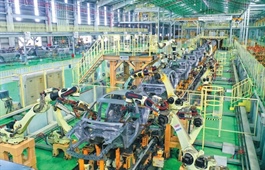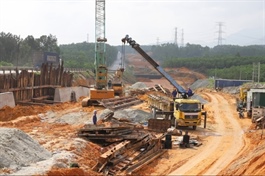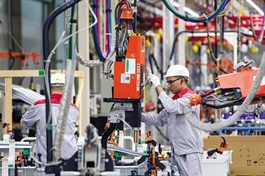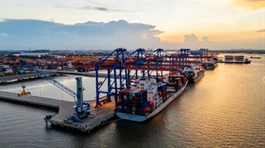Repositioning FDI due to global trends
Repositioning FDI due to global trends
Vietnam is making efforts to turn itself into a destination of high-quality foreign investment. Salvatore Banco, head of Ho Chi Minh City and South China for D’Andrea & Partners, writes about how to reposition this kind of funding in the context of emerging global trends.
The convergence of supply chain restructuring, the twin transitions of green and digital development, rising trade protectionism, and the implementation of global minimum tax commitments is reshaping the landscape of foreign direct investment (FDI).

Salvatore Banco, head of Ho Chi Minh City and South China for D’Andrea & Partners |
For Vietnam, a rising star in the global investment arena, this moment presents both a challenge and an opportunity to reposition its FDI strategy for sustainable, long-term growth.
Vietnam has long been recognised for its openness to foreign investment, attracting billions of US dollars annually thanks to its competitive labour costs, strategic location, and favourable trade agreements. However, the traditional model of pursuing FDI at all costs is no longer viable. The country must now pivot from a focus on quantity to one on quality.
This means prioritising high-value-added projects that are environmentally sustainable, technologically advanced, and committed to technology transfer and workforce development.
The country must move beyond being a low-cost manufacturing hub and instead become a centre for innovation, green technology, and digital transformation.
In this sense, the government has already signalled this shift through its national development strategies, emphasising the importance of attracting FDI that contributes to the country’s industrial upgrading and sustainable development goals. Yet, translating this vision into reality requires a comprehensive overhaul of how Vietnam approaches foreign investment.
Navigating global trends
Firstly, regarding the supply chain restructuring, the pandemic exposed vulnerabilities in global supply chains, prompting multinational corporations to diversify their production bases. Vietnam has benefited from this trend, with many companies relocating operations from China to Southeast Asia. However, to remain competitive, Vietnam must offer more than just an alternative location, it must provide resilience, reliability, and value.
This involves investing in logistics infrastructure, streamlining customs procedures, and enhancing digital connectivity. The development of industrial clusters and smart manufacturing zones can further strengthen Vietnam’s position in global value chains.
Secondly, in green and digital transitions. The global push towards sustainability and digitalisation is reshaping investment priorities. Investors are increasingly seeking destinations that align with environmental, social, and governance (ESG) standards. Vietnam is embracing this shift by boosting green energy projects, circular economy initiatives, and digital innovation.
The country’s commitment to achieving net-zero emissions by 2050 is a positive signal, and it must be backed by concrete policies and incentives. Encouraging FDI in renewable energy, electric vehicles, and smart cities can position Vietnam as a leader in the green transition.
Similarly, digital transformation must be accelerated through investments in digital infrastructure, cybersecurity, and digital skills training. FDI in fintech, e-commerce, and AI can drive productivity and innovation across sectors.
In addition, the resurgence of protectionist policies in major economies poses risks to global trade and investment flows. Vietnam must navigate this environment by strengthening its trade diplomacy and leveraging its network of free trade agreements.
These agreements provide preferential access to key markets and enhance Vietnam’s attractiveness as an investment destination. However, compliance with international standards and rules of origin is essential to fully capitalise on these opportunities.
The OECD-led global minimum tax initiative aims to curb tax base erosion and profit shifting by multinational corporations. While this may reduce the effectiveness of tax incentives as a tool for attracting FDI, it also levels the playing field and encourages investment based on fundamentals.
Vietnam must adapt by building a renewed value proposition that goes beyond tax breaks. Institutional transparency, efficient governance, and a stable regulatory environment will be key to attracting responsible and long-term investors.
To reposition its FDI strategy, the country must craft a compelling value proposition that reflects its evolving strengths and aspirations.
This involves several critical components. First is the institutional transparency and governance. Investors seek predictability and fairness: strengthening the rule of law, combating corruption, and ensuring transparent regulatory processes are essential to building investor confidence. Vietnam’s ongoing administrative reforms and digital government initiatives are steps in the right direction, and it is clearly perceived that this trend will continue.
Secondly, infrastructure remains a cornerstone of investment attractiveness. Continued investment in transport networks, energy systems, and digital infrastructure will enhance connectivity and reduce operational costs. Public-private partnerships can play a vital role in financing and implementing large-scale infrastructure projects.
Thirdly, a proactive and professional approach to investor relations can make a significant difference. Establishing dedicated investment promotion agencies, offering one-stop services, and providing aftercare support can improve the investor experience and encourage reinvestment.
Last but not least, the high quality of life for international talent. As Vietnam seeks to attract knowledge-intensive industries, it must also cater to the needs of international professionals. Quality healthcare, education, housing, and cultural amenities contribute to a liveable environment that supports talent retention and productivity.
|
Targeting strategic investors
Vietnam’s repositioning strategy must centre on identifying and cultivating strategic investors whose interests align with the country’s national development priorities. In the context of an evolving global landscape and regional competition, the nation must channel its efforts into sectors that not only drive innovation but also strengthen economic resilience.
To begin with, high-tech manufacturing presents a key avenue for growth, particularly in fields such as semiconductors, robotics, and advanced electronics. These industries are crucial for elevating Vietnam’s position in global supply chains and fostering technological sovereignty.
In addition, the renewable energy sector, encompassing solar, wind, and green hydrogen, offers immense potential for sustainable development. By attracting investment in clean energy technologies, Vietnam can transition away from fossil fuels while boosting energy security and environmental stewardship.
Furthermore, the digital economy stands as a cornerstone for modernisation. Strategic investment in software development, cloud computing, and AI can propel Vietnam into the forefront of digital transformation, fostering competitiveness across industries.
Equally important is the healthcare and biotechnology sector. Investments in pharmaceuticals, medical devices, and biomedical research support public health and also create high-value jobs and strengthen the country’s scientific base.
Finally, education and training play a critical role in shaping Vietnam’s future workforce. Areas such as vocational education, edtech, and lifelong learning solutions are essential for equipping citizens with the skills demanded by tomorrow’s industries.
To support these strategic investors, Vietnam should implement tailored policies such as preferential land access, streamlined licensing procedures, and generous incentives for research and development. These measures, if thoughtfully applied, can nurture long-term partnerships and reinforce Vietnam’s trajectory towards high-quality, sustainable growth.
Repositioning FDI is not merely about attracting capital, it is a strategic step towards enhancing Vietnam’s role in global value chains. By focusing on quality investment, Vietnam can move up the value ladder, increase domestic value-added, and reduce dependence on low-cost labour.
Tech transfer, local supplier development, and upskilling are critical to this process. Encouraging joint ventures, innovation hubs, and university-industry collaboration can accelerate knowledge diffusion and capacity building.
Vietnam stands at a pivotal crossroads in its FDI journey. Global trends such as supply chain shifts, digital transformation, sustainability imperatives, and evolving tax regimes present both challenges and opportunities. In response, the Vietnamese government has shown strategic foresight and bold commitment to reform, actively repositioning the country as a premier destination for high-quality, sustainable investment.
By embracing innovation and inclusivity, Vietnam is not only attracting strategic investment, it is reshaping its economic identity. Through proactive governance and visionary leadership, the country is building a resilient, prosperous future, with FDI as a catalyst for industrial upgrading, technological advancement, and inclusive growth.
- 15:00 30/07/2025




























